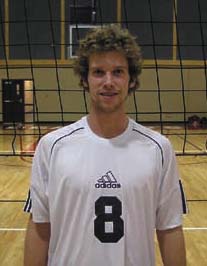Abbotsford, B.C.
Stephen Balzer is a hard-working guy. In his final year in the biblical studies program at Columbia Bible College (CBC), Stephen has always worked to pay his way through school. His job of choice was tree-planting—good money but hard work indeed. So when a sudden injury to his wrists cut short his ability to work and to earn money, he thought his dream of completing his education was over.
 |
Stephen Balzer is enjoying his final year at Columbia Bible College—made possible by an alumnus who made an anonymous contribution.
|
It’s been a long journey for Balzer to get to this year. He began his educational career as a missions major, but chose to switch to biblical studies part way through, as it would give him more options in the future. Unfortunately, not all of his courses transferred to this program and so he was left having to do a fifth year of schooling, which meant having to find money to cover his school fees. He started tree planting and also applied for bursaries. First his injury cut short his earning potential and then he found out that he wouldn’t receive the bursary money he’d been counting on either. He thought of living at home for the year, but his internship required him to live on campus; the whole situation was just frustrating.
“I couldn’t believe it,” he remembers. “I kept thinking I should have graduated last year. I’ve spent all this time and money already, I’ve always had hard physical jobs, but now I’ve got this injury, and now this!”
However, Balzer had come too far not to finish, so he registered for school and prayed that God would help him find a way to pay for it.
Unbeknownst to Balzer, God would work a small miracle or two in his life using the lives of others as his vehicle.
First, his father offered to pay a portion of his school fees. Balzer had never asked his parents for money and never expected them to do so, so this offer was moving.
“It was an awesome gesture,” he says. “I cried. He never does this kind of thing. I’ve always paid for my education myself, so this was awesome.”
At the same time, in another province, Bill, a CBC alumnus, and his wife Linda (not their real names) were praying and considering giving a gift to the college. Bill had enjoyed his experience at CBC and was looking for a way to give back to the college.
“The people I met while attending [CBC] left an impact on my life,” Bill says. “We have been financially blessed and have been seeking an avenue outside of regular giving. Providing someone the opportunity to attend or remain seemed a proper way to recognize the benefits I received from CBC.”
They sent a donation to Paul Wartman, CBC president, only saying that they wanted to money to benefit a student in need. Stephen’s predicament had come to Wartman’s attention just as he received their gift. He summoned Stephen to his office.
“So I go to Paul’s office and he hands me this cheque for $2,000 and says, ‘This is God answering your prayer.’ I just started crying,” Stephen says, now laughing.
Together with his father’s gift, Balzer had enough to cover his costs for the semester—his prayers had been answered. But, he says, the story doesn’t really end there.
“Still thinking that he needed a job, Balzer applied to Mennonite Central Committee Supportive Care Services, to work as a support worker in one of their homes for those with mental and physical challenges.
“It’s awesome!” Balzer exclaims. “I wake up wondering what God’s gonna do today. It’s like now the more dependent I am, the more down and out, the more I come out thinking God’s got a plan, you know? Coming from such a low to now—where I have a job, I’m going to graduate, there’s hope!”
Balzer hopes to work for awhile and eventually complete a masters degree. He wants to work with people in a church setting and feels that he’s gifted for this ministry.
His anonymous benefactors are grateful that God was able to use their gift in such a wonderful way. “We believed that a good decision would be made, and by the reaction we are confident that Stephen fit the criteria we provided,” Bill says. “It is always hoped that there can be multiple benefits from one action. It seems there are to be many benifits as a result of our small contribution. For this, we are grateful.”
—Columbia Bible College release

